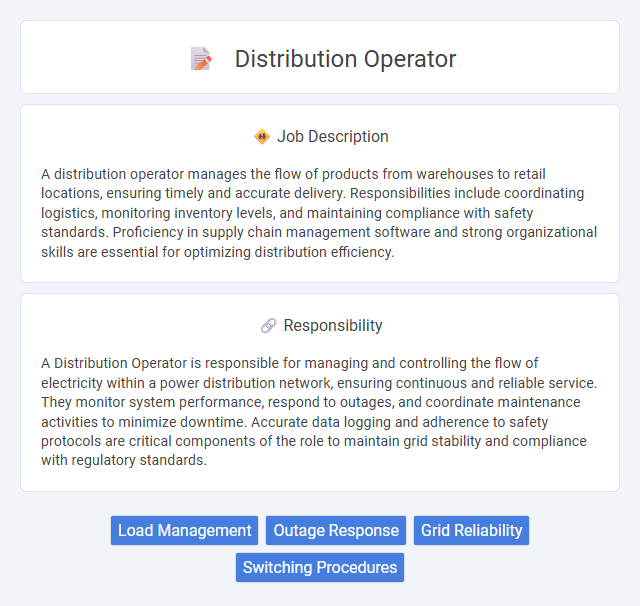
A distribution operator manages the flow of products from warehouses to retail locations, ensuring timely and accurate delivery. Responsibilities include coordinating logistics, monitoring inventory levels, and maintaining compliance with safety standards. Proficiency in supply chain management software and strong organizational skills are essential for optimizing distribution efficiency.
Individuals with good physical stamina and the ability to handle repetitive tasks will likely find the distribution operator role suitable, as it often involves lifting, sorting, and organizing goods. Those who thrive in fast-paced environments and possess attention to detail might benefit from this job, while people who struggle with physical demands or require a sedentary position may find it challenging. Probable success in this role depends on adaptability, reliability, and the willingness to work varying shifts.
Qualification
A Distribution Operator must have a high school diploma or equivalent, with specialized training in electrical systems or industrial maintenance highly preferred. Certifications such as OSHA safety training, CPR, and first aid enhance job readiness and compliance with industry standards. Strong knowledge of electrical distribution networks, mechanical aptitude, and the ability to interpret technical diagrams are essential for efficient operation and maintenance of distribution equipment.
Responsibility
A Distribution Operator is responsible for managing and controlling the flow of electricity within a power distribution network, ensuring continuous and reliable service. They monitor system performance, respond to outages, and coordinate maintenance activities to minimize downtime. Accurate data logging and adherence to safety protocols are critical components of the role to maintain grid stability and compliance with regulatory standards.
Benefit
Distribution operator jobs likely offer benefits such as competitive wages and comprehensive health insurance, which contribute to financial stability and well-being. Employees may have opportunities for skill development and career advancement within the logistics or supply chain sectors. Job security could be enhanced by demand for reliable operators who ensure efficient distribution of goods.
Challenge
The challenge of a distribution operator job likely involves managing complex logistical networks to ensure timely delivery and inventory accuracy. This role probably requires quick problem-solving skills to handle unexpected delays or equipment malfunctions. Effective communication and coordination with multiple teams are essential to maintain efficient distribution workflows.
Career Advancement
Distribution operator careers offer significant opportunities for advancement through skill development in logistics, inventory management, and equipment operation. Gaining certifications such as forklift operation and supply chain management enhances promotion prospects to supervisory or logistics coordinator roles. Continuous learning and proficiency with warehouse technology systems are critical for progressing to managerial positions within the distribution sector.
Key Terms
Load Management
Load management in distribution operator roles involves coordinating the efficient allocation and delivery of electrical power across the grid to prevent overloads and maintain stability. Operators analyze real-time data and forecast demand trends to optimize the distribution of electricity, ensuring continuous supply while minimizing energy waste. Advanced load management techniques incorporate automation and smart grid technologies to enhance responsiveness and reliability in power distribution systems.
Outage Response
Distribution operators play a critical role in outage response by quickly identifying and isolating faults within the electrical distribution network to restore power efficiently. They utilize advanced monitoring systems and real-time data to coordinate repair crews and manage system rerouting, minimizing downtime. Effective outage response by distribution operators ensures enhanced grid reliability and improved customer satisfaction.
Grid Reliability
Distribution operators ensure grid reliability by managing the safe and efficient delivery of electricity from substations to end users. They monitor load levels, detect faults, and coordinate outage restorations to minimize disruptions and maintain continuous power supply. Expertise in SCADA systems and real-time grid analytics is essential to rapidly respond to emergencies and optimize distribution network performance.
Switching Procedures
The distribution operator plays a critical role in executing switching procedures to ensure safe and reliable power flow within the electrical grid. Accurate planning and coordination during switching operations minimize outages and equipment damage while maintaining system stability. Proficient knowledge of switching diagrams and real-time system monitoring is essential for preventing faults and ensuring compliance with utility protocols.
 kuljobs.com
kuljobs.com